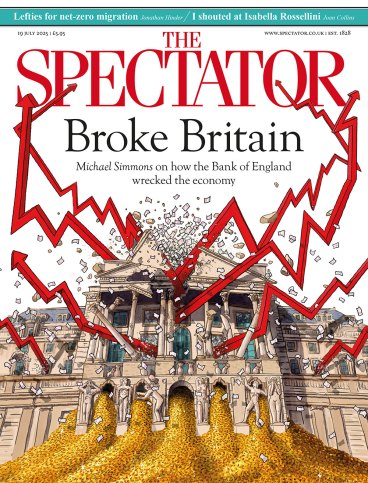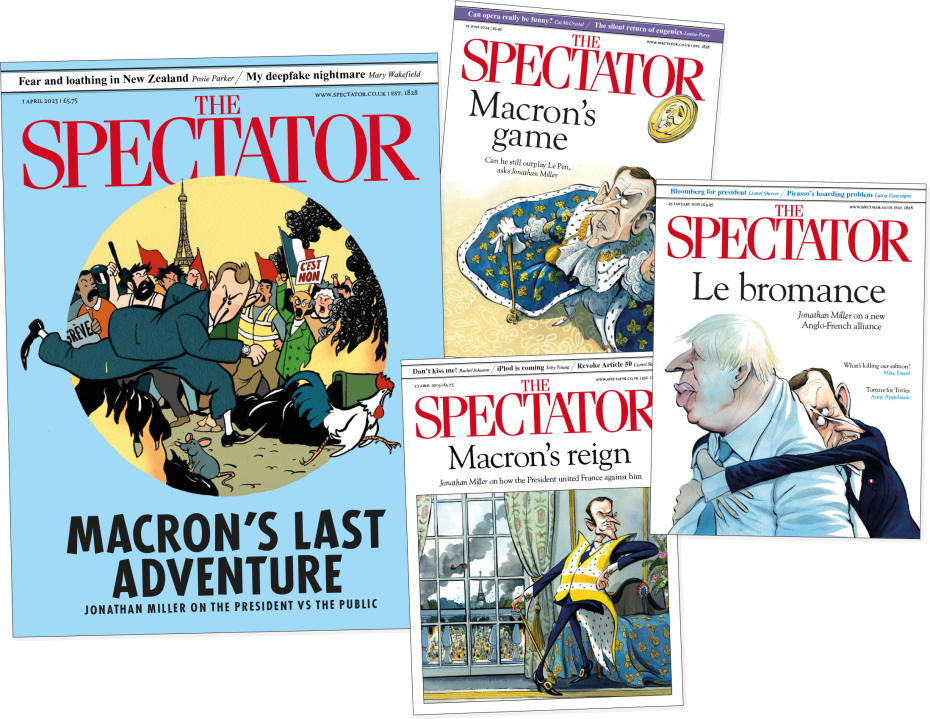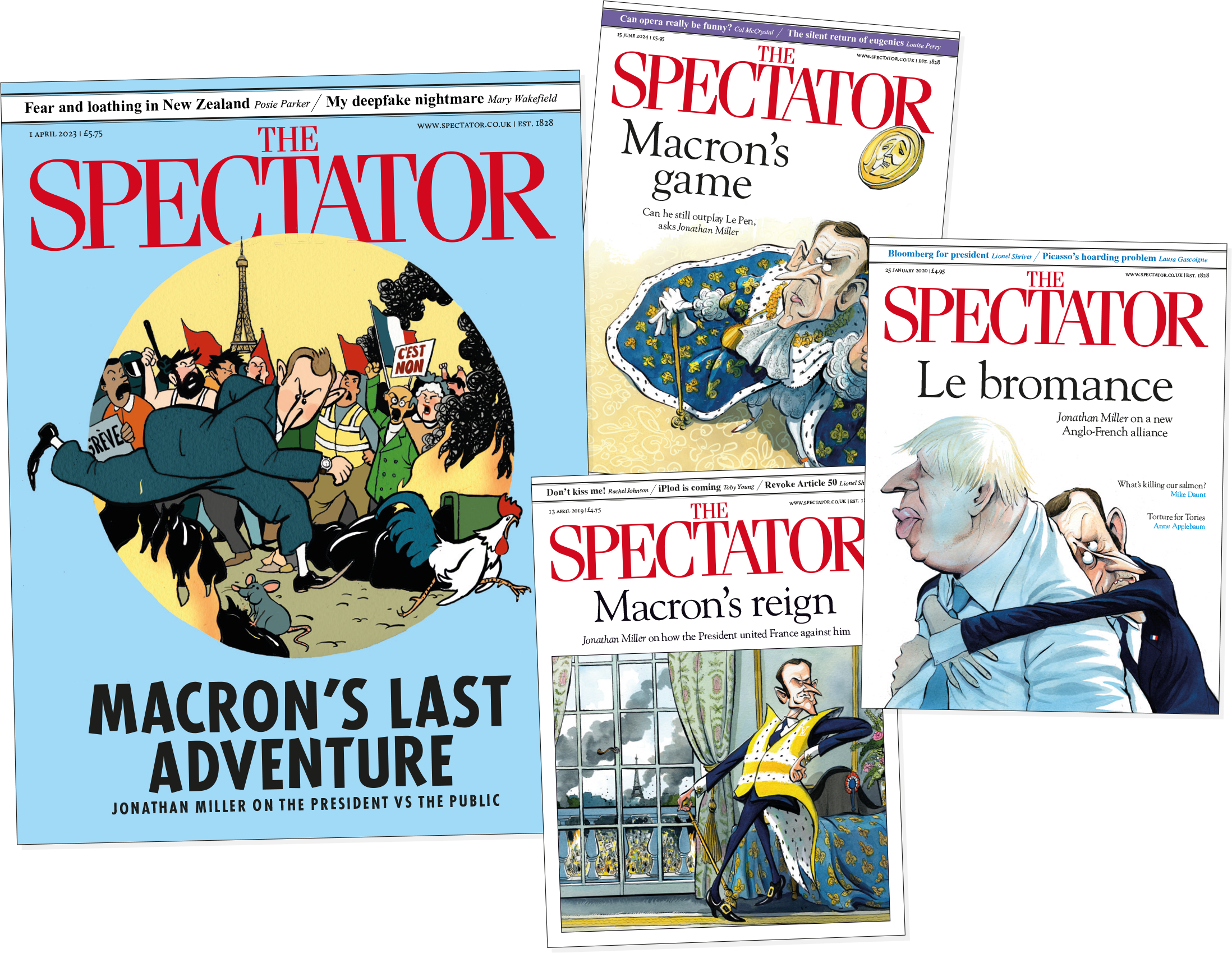
The journalist Jonathan Miller, a cherished Spectator contributor, died last week at his home in Occitanie, France. Below is an extract from the memoir he had only just completed, Shock of the News: Confessions of a Troublemaker. Here he explains how he came to write about French politics and culture for the magazine.
I t was Andrew Neil who prodded me from my lethargy. Andrew lives on the posh Provençal side of the Rhône while we’re on the plouc side nearer Spain. I’m more likely to run into him in England or New York than France. But we keep in touch by email. When Emmanuel Macron began his manoeuvres for the presidency, I sent a gossipy email to Andrew explaining why I thought he might win, and how peculiar he was. Andrew was then chairman of The Spectator, in addition to presenting for the BBC, and his response was to suggest to Fraser Nelson, The Spectator’s editor, that he take me on as the French political correspondent, writing for the magazine and website. A very grand appointment paying peanuts. Fraser agreed. I have now covered Macron through two presidential elections and non-stop interstitial magouilles (fishy moves) that make his reign a golden one for a freelancer.
Many rum coves have ruled France and Macron is among the rummiest. I had a feel from the start that there was something pathological about him. The narcissistic personality disorder was in plain sight.
There are reasons I’m not invited to Macron’s Elysée Palace for cosy chats, like Sophie Pedder, the Economist’s correspondent in Paris, after her magazine depicted Macron walking on water and declared him Europe’s saviour. My line is less charitable. A few headlines from my author page at The Spectator offer a flavour of my coverage. ‘Emmanuel Macron looks shiftier and less likeable by the minute,’ I wrote in November 2017. ‘Macron is the author of his own despair’ in December 2024, after he plunged the country into new chaos with yet another tantrum.
I have never met Macron. Living in the Languedoc I’m far from included in the charmed circle of political journalists in France, who in their groupthink bubble are identical to their homologues in London and Washington. It’s a club of which I don’t wish to be a member, and given how rude I have been about them, they wouldn’t want me. But I know people who know Macron and reckon I have better understood him than most, or at least have been willing to go farther than many of my colleagues in Paris, who have covered up his peculiarities much as the White House press covered up the mental decline of Joe Biden. Deference is a defect in a republican system where the de facto head of government is also head of state.
Emmanuel Macron has united France against him. But he’s been good for me
A number of my articles were translated into French and republished in Courrier International magazine. I don’t know if Macron has seen them. But someone at the Elysée probably has, so I’m persona non grata there. I’m not bothered by my lack of access to the presidential palace. I see Macron much more through the filter of the people in my village. When the Gilets Jaunes movement started in France in late 2018 as a grassroots protest against fuel tax hikes and the rising cost of living, I understood it immediately because the demonstrators in their high visibility gilets were my neighbours. While journalists in Paris were demonising the demonstrators as thugs and trouble-makers, I was spending time with them on the roundabouts where they’d set up their camps. My labrador, Ringo, was as ever an icebreaker. I have a soft spot for troublemakers.
Macron has united France against him. But he’s been good for me. The Spectator can’t get enough of him. In July 2024, after he had lost his parliamentary majority after throwing a hissy fit calling unnecessary elections, I opined that he can be very charming in a small group, where it’s clear he is the sovereign. But in public he is clumsy and sometimes outrageous. Also, bizarrely, I have noted how he loves to dress up.
At the very start of his presidency, he had himself photographed in a beautifully cut suit, the Légion d’Honneur on his lapel luminous as if lit by a laser, solemnly proceeding through a hall at Versailles, flanked by the Republican Guard in their extravagant dress uniforms, with drawn swords. It was beautifully photographed, and an extraordinary, boastful image. The French had elected a king, an absolute monarch.

Soon, after brutally sacking the chief of the military to show he was in charge, he moved to establish his authority as commander in chief by visiting a French nuclear submarine and dressing up like a naval officer in a military tunic. A grand spectacle. He arrived in a military helicopter. More recently he wore a black hoodie to channel Volodymyr Zelensky. Macron the warrior. Then it was his Sylvester Stallone tribute, Emmanuel ‘Rocky’ Balboa Macron, working out with a punch bag in a gym in Paris. The photograph was taken by the official Elysée photographer and the bulgy biceps are rumoured to have been photoshopped in post-production. The stunt is thought to have been Brigitte’s idea. Boxing fans were nevertheless unimpressed by his jab.
In the most provocative gesture of them all, he dressed up like Tom Cruise. The very day after the first round of the 2024 National Assembly election, which he had lost, he was parading before the paps in a stylish leather jacket and baseball cap. The Top Gun. Lieutenant Emmanuel ‘Maverick’ Macron. Brigitte wore Yves Saint Laurent. Macron imagines himself to be Jupiter, king of the gods. I see him as an actor manqué, a rampant narcissist.
I doubt that attending Elysée press conferences is necessarily an effective way of covering this presidency. Keeping your eyes open to what you see, and not what politicians say, is better. This is a Miller Rule of Journalism. There’s no substitute for observation, whether you’re covering a presidency or a village fête. I’m now probably getting a little weary of Macron. And I am not thrilled at the prospect of writing about another presidential election. But just like a politician, I’m not ruling it out. Maybe one more rodeo.
I adore France and the French. When I am rude to them, it is because I love them
More and more, my writing for The Spectator has become a potpourri of other subjects about life in modern France. The French are frequently caricatured by British journalists, mocked for a lengthy list of supposed defects including even, pace Kelvin MacKenzie, dodgy food. It is true that they eat at McDonald’s a million times a day, the national dish is pizza, which is sometimes sold in vending machines, and that they often make it with the wrong kind of cheese, Emmental not mozzarella. There is even a journalistic sub-genre for this. It’s called froggie bashing. I have frequently been accused of such bashing and angrily plead not guilty. I adore France and the French. When I am rude to them, it is because I love them. Also, unlike my experience in Surrey, few people in my village can read my articles, so I’m not widely hated here.
Where I do bash the French, it is mainly on the point of what I have come to believe has been their grossest geopolitical miscalculation. The French elite is consumed with suspicion of Britain and America while obsessed with cosying up to the Germans. Anglophobia is embedded in France for obvious reasons, given the history, even after the Entente Cordiale and Britain rescuing France twice from the ‘boches’ (Germans). After the war, this hatred of the Anglo Saxons was baked in by the hyper-Anglophobic General de Gaulle. He hated the British despite or perhaps because we saved his bacon. But the British ought to be the best friends of France, not the Germans.
The refusal of the French to follow my wise advice has been a catastrophic, historic sequence of events. Refusal to reset when the Wall came down was the cause of Brexit and much else, in my amateur opinion. And now look at the mess. The country is broken. Nearly half the population fears civil war. But from chaos comes wonderful stories. And France is but one area kind enough to provide plenty chaos for stories in my book.
Jonathan Miller’s Shock of the News: Confessions of a Troublemaker is published on 1 August.









Comments